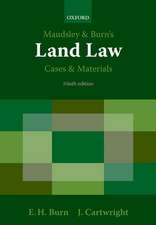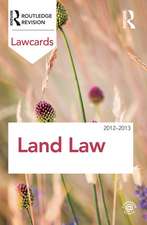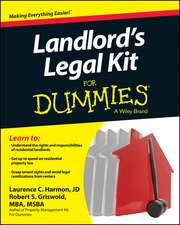Protection of Immovables in European Legal Systems: The Common Core of European Private Law
Editat de Sonia Martin Santisteban, Peter Sparkesen Limba Engleză Hardback – 10 sep 2015
Din seria The Common Core of European Private Law
- 11%
 Preț: 432.04 lei
Preț: 432.04 lei -
 Preț: 439.01 lei
Preț: 439.01 lei -
 Preț: 362.34 lei
Preț: 362.34 lei -
 Preț: 363.07 lei
Preț: 363.07 lei -
 Preț: 361.58 lei
Preț: 361.58 lei -
 Preț: 473.73 lei
Preț: 473.73 lei -
 Preț: 445.55 lei
Preț: 445.55 lei -
 Preț: 361.37 lei
Preț: 361.37 lei - 14%
 Preț: 1131.46 lei
Preț: 1131.46 lei - 14%
 Preț: 1048.33 lei
Preț: 1048.33 lei -
 Preț: 440.15 lei
Preț: 440.15 lei - 14%
 Preț: 1128.25 lei
Preț: 1128.25 lei - 14%
 Preț: 948.00 lei
Preț: 948.00 lei - 9%
 Preț: 1188.95 lei
Preț: 1188.95 lei -
 Preț: 325.16 lei
Preț: 325.16 lei - 16%
 Preț: 458.07 lei
Preț: 458.07 lei - 29%
 Preț: 881.78 lei
Preț: 881.78 lei
Preț: 899.66 lei
Preț vechi: 1046.12 lei
-14% Nou
Puncte Express: 1349
Preț estimativ în valută:
172.17€ • 186.95$ • 144.62£
172.17€ • 186.95$ • 144.62£
Carte tipărită la comandă
Livrare economică 22 aprilie-06 mai
Preluare comenzi: 021 569.72.76
Specificații
ISBN-13: 9781107121928
ISBN-10: 1107121922
Pagini: 536
Dimensiuni: 160 x 236 x 37 mm
Greutate: 0.88 kg
Editura: Cambridge University Press
Colecția Cambridge University Press
Seria The Common Core of European Private Law
Locul publicării:New York, United States
ISBN-10: 1107121922
Pagini: 536
Dimensiuni: 160 x 236 x 37 mm
Greutate: 0.88 kg
Editura: Cambridge University Press
Colecția Cambridge University Press
Seria The Common Core of European Private Law
Locul publicării:New York, United States
Cuprins
Part I. Introduction and Content: 1. A common core to the protection of immovable? Peter Sparkes and Sonia Martín Santisteban; 2. Actions in Roman and civil law for the protection of immovables Frits Brandsma; 3. Fundamental rights in actions to protect immovables Sandra Passinhas; Part II. The Case Studies.
Descriere
Comparative analysis of vindicatio, possessory remedies and trespass across sixteen European jurisdictions based on twelve straightforward factual cases.















